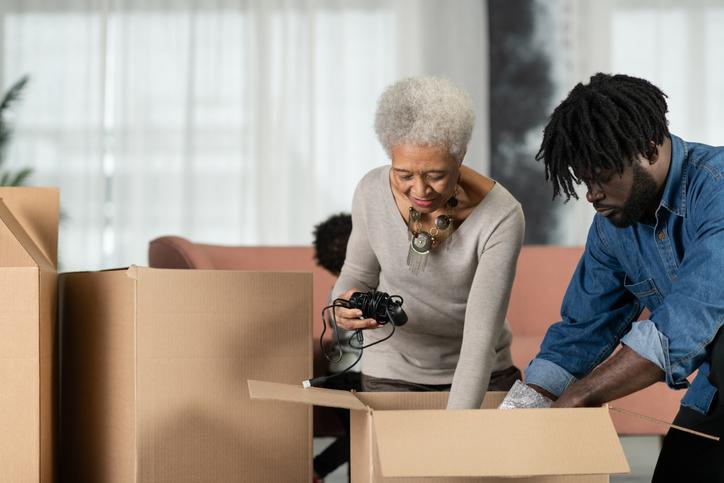We have heard “it takes a village” to raise a child and it is true when caring for aging loved ones. Moving your aging mom and dad into your family home, though is something that needs to be a well-thought-out plan. There are at least 3 considerations before your aging parent moves in that you need to discuss with members of your household. Your aging parent may not want to “be a burden” and may not want to feel “forced” to move in with you and that needs to be explored, as well.
Imagine having to move back in with your parents. If you’re an adult who has been on your own for years, it would be a major upheaval in your life and in the lives of your parents. They may welcome you with open arms, just as you’d welcome them, but it is not as easy as making sure they have a place to sleep.
A study by the AARP, in 2020, found that close to 20% of adults in the United States care for someone who is fifty years old or older. If you’re thinking of having your aging loved one move in with you, you’re going to be one of those statistics. An aging loved one who can no longer live alone is a stressor for your family because you worry if they’re safe, if they’re eating and how they are coping with loneliness, if they’re bathing and many other things.
3 Considerations Before Your Aging Parent Moves In
Before you open your doors to your aging parents, ask yourself:
- Does your aging parent require special assistance for mobility or do they have mental or physical health issues you may not be equipped to handle? Aging loved ones who are healthy and relatively independent and require only a small amount of care is, honestly, much easier than moving in a parent who requires care you may not know how to provide. We know that sometimes a fall or other health issue is what leads to a loved one moving in and this “crisis” move is stressful for everyone.
- Do you have the time to provide any supervision or physical or personal assistance your aging parent requires? If you work outside the home or if you work at home and are raising children, caring for an aging loved one might not be physically possible for you. You need to consider your own health and well being as that of your loved one.
- What kind of relationship do you have with your aging parent? This is not a consideration to be taken lightly or brushed off. If you have long had a contentious relationship, moving them in with you won’t change that. In fact, it may make it more obvious and the living arrangement more difficult.
Here are a few more items you and your family and your aging parent need to think about and consider before your aging loved one moves in.
- Will you need to make special accommodations to your home? Ramps? Wheelchair accessible items? Are the doors in your home large enough to accommodate a wheelchair or walker? Will you need to retrofit your bathroom? Is there a bedroom available for your loved ones that they can call their own? They – and you – won’t want to have to share a space all the time.
- Will you ask your aging parent to contribute to any of the household expenses? They may think you’re moving them in, and they can live rent-free. It’s a conversation you need to have before you make any kind of move. Talk with them about current and potential expenses and talk about any home remodeling or upgrades projects needed to accommodate them safely into your home.
- Do you have buy-in from the rest of your family? Is your spouse or significant other truly on board? How about your children? It may be one thing to have Grandma and Grandpa visit for a few days or weeks a year than it is to have them move in. Also, will they try to intervene in the way you are raising your children? You need to talk about all these things before they move.
What happens when mom and dad are no longer healthy enough to live with you? Where will they go? Even if you’re planning on having them move in with you right now, it makes sense to tour senior living communities and find one in which they want to live should the need arise in the future.
In some cases, it may make sense for your aging parents to move into a senior living community rather than into your home. Moving is stressful and having to move more than once adds to that stress.
Contact an American House community near you, take a tour and also ask about how you can connect with General Fausone to ensure you or your loved one is receiving the veterans’ benefits you, or they, have earned.
American House was founded in 1979 to enrich the lives of seniors and their loved ones in an environment that fosters independence, compassion, quality services and meaningful relationships. We provide a wide range of senior living options, including independent living, independent living with assistance, memory care services provided by a third party, respite stays and hospice in Dearborn Heights, Farmington Hills, Rochester Hills, Sterling Heights and Westland.


Recent Comments